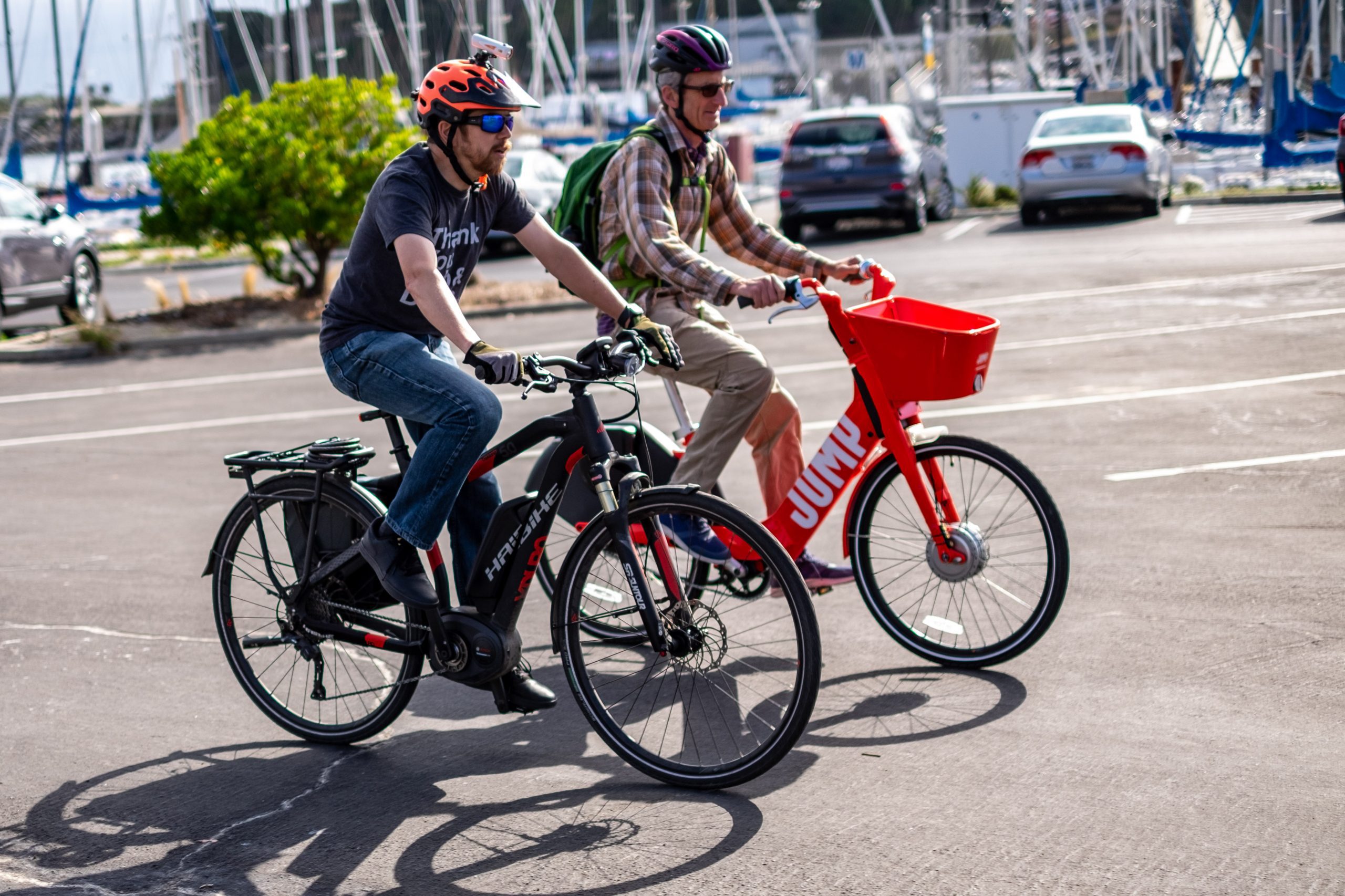Active Transportation |
Expanding Options for Bike Access
There has been a proliferation of bike access schemes recently, including bikeshares, bike libraries, extended demo tests, and bike leases. They all have the goal of getting a greater number and variety of people onto bikes. Traditional bike ownership still has many advantages: reliable transportation and recreation, available when you want it and fully paid for. You make a one-time investment and the bike is yours free and clear. But ownership comes with the responsibility of maintenance and secure storage at home, work, shopping places, and other destinations. For many people this works fine, but for those who don’t want to own a bike, can’t afford the upfront cost (especially for e-bikes, which start around $1,000), lack a good place to store a bike, or don’t want the burden of tracking and scheduling repairs, there are other schemes that might fit their lifestyles and living situations better. What’s more, these options appear to be expanding.
The most popular and best known model is bikeshares, which allow you to rent a bike on a per-trip basis. JUMP electric bikeshares have been extremely well used in the City of Santa Cruz. Some 680,000 bike trips covering around 1.3 million miles were taken in the two years before the pandemic. Bikeshares have many advantages, including no upfront purchase costs, no need for storage, no worries about theft between trips, and no worries about maintenance or repairs. This model works great for commuters and for folks trying to get from point A to point B quickly and conveniently, or by linking different modes of transportation together. But it can take a long time to find an available bike, so bikeshares aren’t 100% reliable.

The local bikeshare 2.0 should hit the streets of Santa Cruz County sometime in 2022. The City of Santa Cruz plans to issue a request for proposals for electric bikeshare vendors this fall. The plan is for the system to be regional rather than restricted to the city limits. The new local iteration is being developed in partnership with Santa Cruz County; the cities of Capitola, Scotts Valley, Watsonville, and Santa Cruz; and UC Santa Cruz and Cabrillo College. But it might start in the City of Santa Cruz and expand to those other areas only after it is re-established there and the other entities take the steps to host bikeshare systems.
To address the problem of unreliable access, there are other non-ownership models, such as bike libraries, that also offer long-term use of a bike you don’t own. There’s a local example right up the hill at UCSC, which operates a bike library for Slug students, staff, and faculty. The bikes are free and available for one quarter at a time. They also come with lights, helmets, and a lock. Participants must take a UCSC Transportation and Parking Services (TAPS) sponsored bike safety class. Sign-ups begin on September 20 for the fall quarter. Click here for more information about the UCSC Bike Library.
There are similar long-running community nonprofits across the country, such as the Iowa City Bike Library, which has been refurbishing used bikes and lending them to community members. According to their website, you can borrow a bike for up to six months. Efforts are currently in the planning stages to create bike libraries in the San Francisco Bay Area to fill gaps in bikeshare service. There is also potential for such a program in Santa Cruz County, where it could complement the regional expansion of bikeshares. This model works well to provide people with regular access to bikes without the burdens of long-term ownership and maintenance.
Books and bikes might not seem to have much in common, but traditional libraries offer a good setting for bike lending services, since they already have well-established lending systems. To this end, some small-town libraries across the country have begun including bike lending among their service to cardholders. A 2019 article in Bicycling magazine featured a few.
Here at Ecology Action, we are always looking for ways to help folks realize the benefits of bikes. One program we operate as part of our Employer Sustainable Transportation Membership provides a two-week e-bike test ride. We feel that two weeks is long enough to see if an e-bike would meet your mobility needs. We want you to see how you can integrate this amazing technology into your life, and we believe that if you have the time to experiment with your commute, take an after-work cruise, or replace a car trip or two to the store, you will be as amazed with e-bikes as we are. This is a “try before you buy” model that gives you enough time to test multiple different rides out and, we hope, find a variety of opportunities for use and experimentation. For more information on this and other sustainable transportation benefits related to our transportation membership, click here.
Epicenter Cycling rents BCycle electric town bikes from their westside Santa Cruz and Monterey stores by way of their online reservation system, for $44.99 a day. These ebikes are designed for Trek’s bikeshare program, so they come with locks, lights, and baskets. The BCycle model has taken root in other coastal cities too, like Santa Barbara, which could be an indicator of the potential for regional bikeshare here in Santa Cruz County.
As we speak, a Santa Cruz startup called MiBike is just getting off the ground. They’re trying to replicate a “bikes as a service” program from the Netherlands. The new effort is aimed at addressing barriers to biking, such as ownership (upfront cost) and ongoing maintenance, by making everything easy and worry-free for the customer. As they say on their site, “It is always easier to find 35 bucks tomorrow than it is to find 600 right now”; and unlike a car lease, the subscription can be stopped at any time. At $35 a month, this could be a great option for UCSC and Cabrillo College students coming into town this fall and getting oriented to the local transportation options. This is like a bike library model, but it’s a month-to-month subscription instead.
In an ever-changing world, the options for bike access are expanding to meet a variety of needs so that more people have affordable, healthy, sustainable, and fun mobility choices. Models like bikeshares, bike libraries, and bike leasing can all bring more options to more people.

